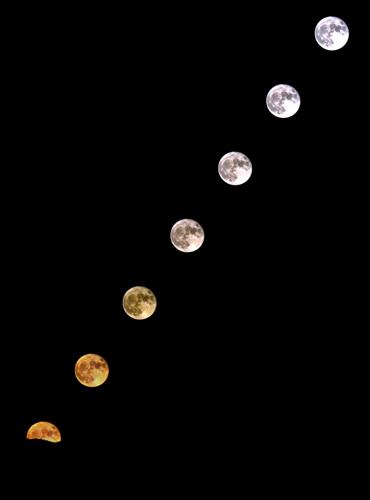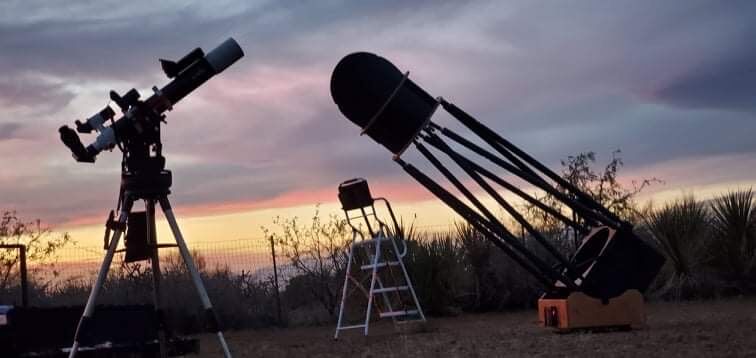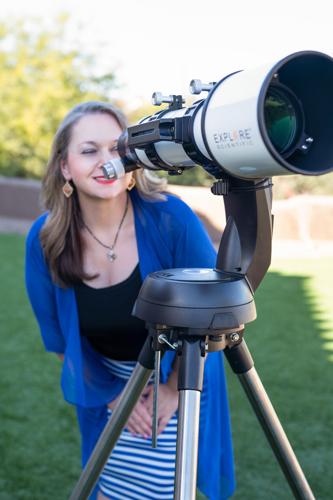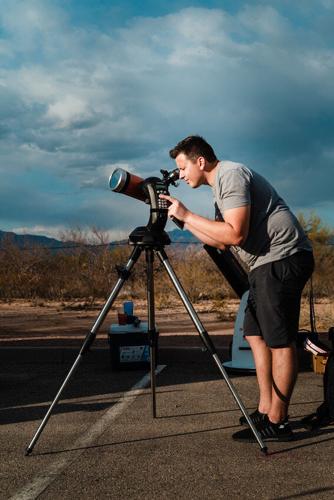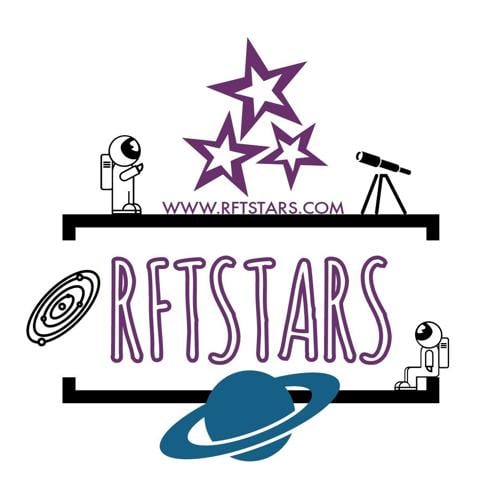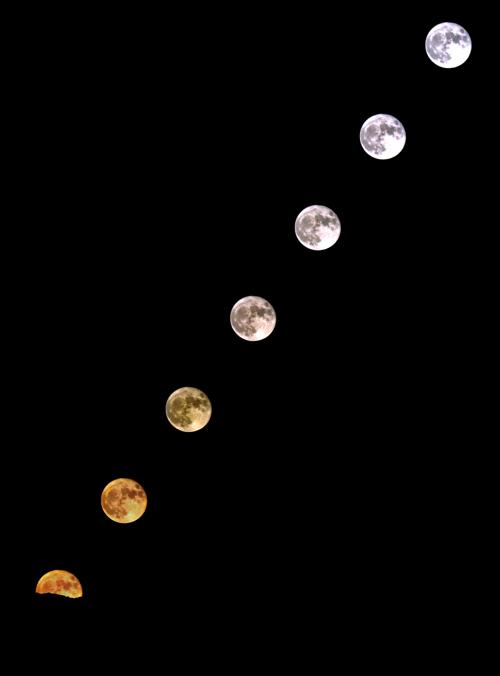A local nonprofit organization led by two combat veterans is helping Tucson’s youth, homeless and overall community tackle hard times and improve their mental health by inspiring those in need to reach for the stars.
The nonprofit, Reach For The Stars, has four programs that positively impact the Tucson community. That includes its stargazing program, which aims to help lower anxiety and improve mental health; providing free telescopes for local kids; supplying care kits for the homeless; and giving free food to families in need through their food pantry.
Since its start in August 2020, the organization has hosted over 53 free monthly community stargazing events, given away over 200,000 meals to over 200 families and gifted 91 telescopes and one-on-one astronomy lessons to local kids.
“People need something to look forward to, something to make them positive and happy. And they (may) need a little bit of support at home with food or hygiene items,” said Carlos Aragon, the CEO and co-creator of RFTStars. “And so we're the only nonprofit in the U.S. that combines those two things and it's something that really caught on quick.”

Kira Reid, one of the co-creators of Reach for the Stars peeks through a telescope.
“At first, we wanted to start with a veterans organization because we're both veterans,” said Kira Reid, the organization’s co-creator and chief operating officer. “But then we thought, you know, we don't want to exclude other people because we feel like everybody needs help.”
Recently, the organization has shifted its focus to helping local youth who experience anxiety or depression through an “alternate coping mechanism,” according to Aragon. That new coping mechanism is stargazing.
Throughout the organization’s research and surveys conducted, nearly all of the participating teenagers had some type of anxiety or depression, according to Reid. According to the CDC, about 4.4 million (7.1%) kids ages 3-17 years old have diagnosed anxiety and 1.9 million (3.2%) have diagnosed depression.
“That’s when we started really realizing that, you know, 'Wow, our youth are really struggling,'” she said. “We can do better.”
Through the organization’s youth telescope program, kids in need receive a telescope and an amateur astronomer starter kit that features a couple of books, eyepieces and a star chart. But most importantly, they will receive a one-on-one astronomy lesson from the organization that demonstrates how to operate the telescope and tips and tricks on gazing at the stars.
“Because children are the future, they are the ones that we need to help the most, not that the other individuals need it less, but children are the ones that, you know, if we can grasp onto them now while they're in grade school, generations will change,” Reid said. “So we decided that we were going to use our programs, not change our programs, but just reorganizing them and really helping the children (through education and volunteerism).”
But as the need for help has skyrocketed over the past year, the organization recently found itself needing to expand, as they are currently operating out of the co-founders’ home in Vail, which houses a food pantry and 25 telescopes.
As part of RFTStars’ desire to keep helping the Tucson community, they are currently attempting to raise $100,000 to build a community observatory and learning center that will be the organization's permanent home.
For Aragon and Reid, building a community observatory would bring the story of how their organization came to be full circle.
From living in darkness to becoming a shooting star for those in need
When Aragon and Reid met at a rehabilitation center in 2018, he said to her, “Do you see those two things, those two dots in the sky? That's Jupiter and Saturn.”
“That's the very first thing he ever said to me and now we have Reach for the Stars. How sweet is that?” she said.

The couple is open about their past struggles, including Reid’s six-month battle with alcoholism and Aragon’s bout with homelessness, addiction to painkillers and depression after suffering a career-ending arm injury during his time in the Air Force.
“We'll understand any veteran that comes to us, but we’ll also take anyone else,” Reid said. “We've been through the system, so we understand different things when it comes to the system, mental health and addiction and struggles, a lot of struggles.”
But those struggles led them to look for the stars for answers. And one day after Aragon said he was at home dwelling in his own sadness, he decided to get up and visit a local Walmart to purchase a telescope. That’s when the stars finally aligned.
Through the lens of that simple Walmart telescope, he saw Jupiter, Saturn and the moon up-close for the first time.
“I wasn't thinking about money, I wasn't thinking about my appointment the next day, I wasn't thinking about anything else,” he said. “I was in the moment out there in the silence, peaceful. Seeing all the stars above me, just knowing, like, everything is awesome. Everything is fine. I'm alive. I'm grateful to be here. And I wasn't thinking about any of the negative things. So that was easy. I want to just share that with other people.”

Carlos Aragon, one of the co-creators of Reach for the Stars looks through one of the organization's 25 telescopes.
They quickly realized that astronomy could be healing for themselves but also for the community.
From there, the duo continued to purchase more telescopes and started an astronomy club where community members could come out and stargaze. But after realizing how many community members needed help, they decided to take their club to the next level by going down the nonprofit route.
“People have a hard time trusting you just based off your work,” Aragon said. “And to really make somebody, who has a child that's struggling, trust a group of people to help change their kid, to have an impact on their life, you cannot just be a club, you know, you want it to be official, you want to be transparent.”
Aragon continued:
“(We also wanted) just to kind of solidify it for ourselves, like, to make it a full commitment. We are both recovering addicts and we have to stay busy and, you know, dedicated, and making it a nonprofit helped us realize that people are going to be counting on us.”

Various telescopes sit outside as the sun sets for one of Reach for the Stars’ free monthly community stargazing events.
Since growing into a nonprofit, the organization has received 11 grants and added 73 volunteers to its roster, 43 of which are local youth.
The organization is always looking for volunteers to help with stargazing events, the food pantry program, fundraising and marketing.
Reid, who has thousands of hours of volunteer experience in various states, said that this is the first community that has been supportive of one another.
“Tucson is amazing,” she said. “And I am so happy that we are here and that we started this organization here because I know that our (participating) families are going to be taken care of.”
From hardships and struggles to inspiring the community to look toward the stars, Aragon, Reid and the rest of the RFTStars team will continue on an upward trajectory to keep helping Tucson’s most vulnerable communities.
“I've never been happier than I am now,” Aragon said. “We don't make an income and we get to work with the community and meet people. And it's amazing to be able to control this passion and ensures that it thrives.”
For more information about Reach For The Stars or to get involved, visit their website.


